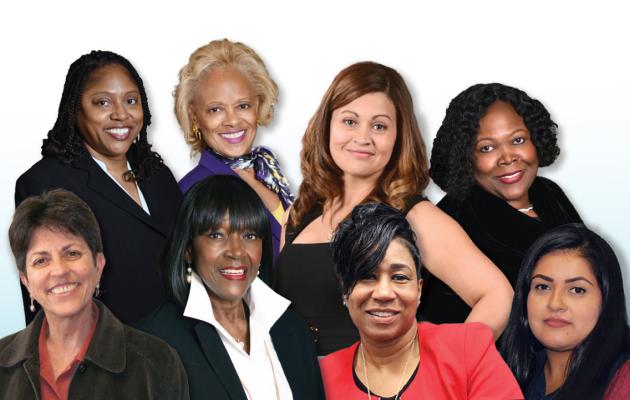Women's History Month in March

1st row (from left to right): Nora Yusa (Board of Directors, Chair), Venest Henry-Evans (Board of Directors, 1st Vice Chair), Patrice Mustafa (Chief Operating Officer), Jessica Ortiz (Senior Director of Compliance and Supervisory Committee Liaison)
2nd row (from left to right): Cynthia Meekins (Board of Directors, Assistant Treasurer), Belinda Walker (Board of Directors, Treasurer), Emma “Jacky” Magarin (Supervisory Committee, Vice Chair), Gladys Berry (Board of Directors, Secretary)
International Women’s Day is March 8, 2025. During the month, we’ll celebrate the legacy of Women’s History and remember the generations of trailblazing women and girls who have built our nation and shaped our progress to our current day.
We invite you to celebrate Women’s History Month with us filled with learning and fun. We also invite everyone to visit WomensHistoryMonth.gov and learn more about the vital contribution of women to our American history.
This Year’s Women’s History Month Theme: Women Educating and Inspiring Generations
This theme celebrates the collective strength and influence of women who have dedicated their lives to education, mentorship, and leadership. Women’s leadership in education has consistently inspired generations, shaping the future of learning. As we celebrate Women’s History Month, let’s commit to moving forward together in empowering, educating, and inspiring future leaders—whether in the classroom, the boardroom, or the community.
Women’s History Month Beginnings
Did You Know? Women’s History Month started as Women’s History Week . . .
In 1980, President Jimmy Carter declared the week of March 8, 1980, as Women’s History Week. In the following years, Congress passed joint resolutions proclaiming Women’s History Week. Then, in 1987, Congress officially designated March 1987 as the first Women’s History Month. Since then, Presidents from 1988 onward have all made an annual proclamation of Women’s History Month.
Stemming from International Women’s Day, Women’s History Month was first celebrated on March 8, 1911. Decades later, in 1987, the local school district in Sonoma, CA celebrated Women’s History Week. Shortly after, in 1979, several organizations celebrated and advocated for Women’s History Week together: Sarah Lawrence College, the Women’s Action Alliance, and the Smithsonian Institution.
Check out some of the ideas in this list that can be done in a way that embraces a powerful theme.
Things you can do to lift up women:
- Learn about female educators, innovators and inventors throughout history
- Gift someone an “empower” box of goodies from women-owned businesses
- Join a yoga a session, virtual or in-person, that focuses on rest, reflection, and healing
- Play Women’s History Month trivia with friends or family
- Honor influential female artists and creatives
- Create care kits for girls and women
- Volunteer with a nonprofit that empowers women and girls
- Give a special woman a “healing” gift, such as a massage or healthy meal
- Explore online exhibitions with the National Women’s History Museum
- Celebrate Women’s History Month on your social media
- Explore the online Exhibit, “Girlhood (It’s Complicated)” from the National Museum of
- American History
- Share your favorite Women’s History Month quotes
- Post about inspirational stories of female entrepreneurs, inventors, scientists, and leaders
- Follow, connect and network with women-owned and women-run businesses
- Amplify the voices of female thought leaders in your industry
Facts that might surprise you
In 2021, a record number of women led Fortune 500 companies. However, that record included only 41 women out of 500 CEOs. In other words, only 8.1% of Fortune 500 CEOs are women.
Around the world, women comprise just 4.6% of the Global 500 CEO list. This means that only 23 out of the 500 CEOs on this list are women. More women than ever before are also serving in the 117th United States Congress. But, representation for women in this important branch of government is still far from equal despite some advances throughout American history. Currently, just under 27% of Congress is female.
Throughout U.S. history, only 3.1% of all members of Congress have been women. Globally, just 10 countries have a woman Head of State. Additionally, 13 countries have a woman Head of Government.
At WPCCU, women have the majority on our Board of Directors. In fact, our Chair, is a woman.
